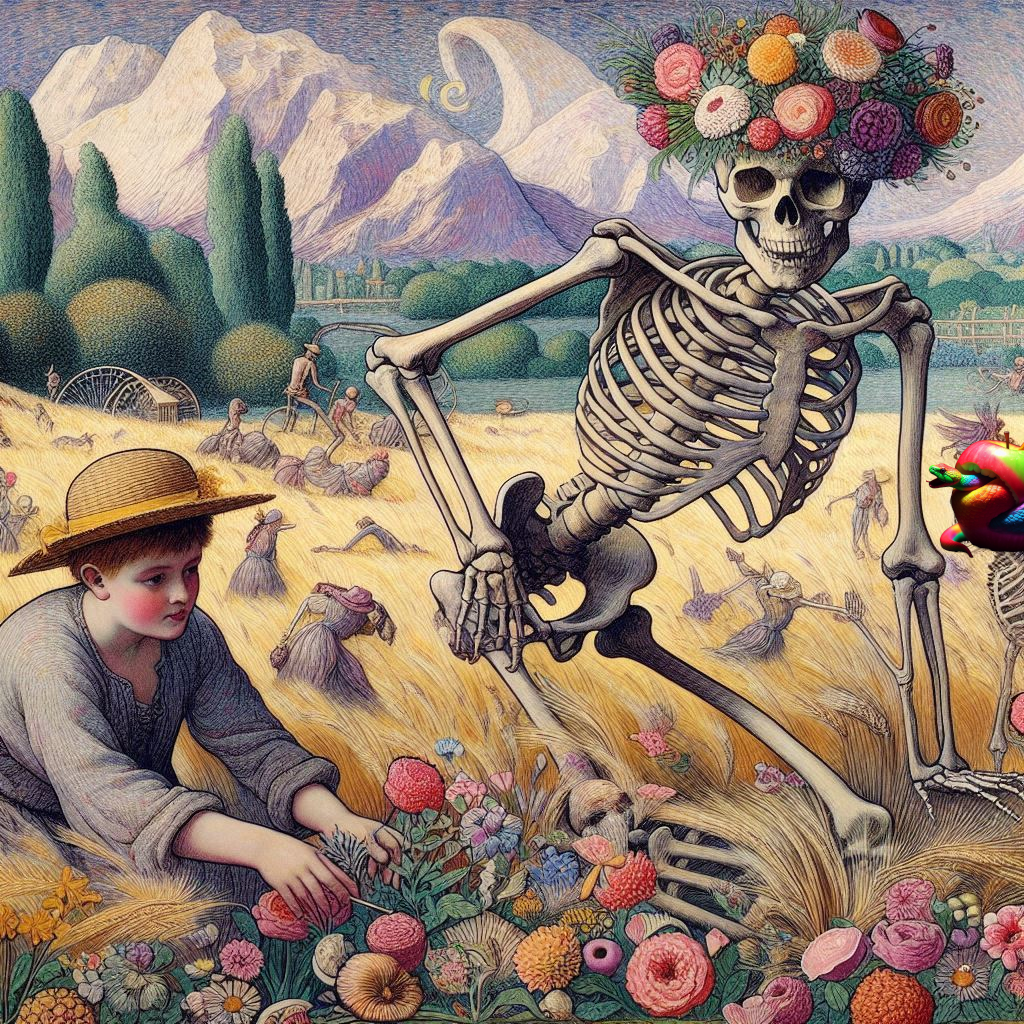Culture versus the world

Once upon a time in the beginning was the word and everything was the text. A sublime mechanick whose logicks, predicated on magicks, preyed on our prayers.
But… —if, as I have been saying, much of what we do and name, and seek cause for, are outcomes of an urge we do not name, but just live wordlessly, then when we seek answers as to what the causes are… then we will not notice the urge itself. We fling words about like greetings and insults all mixed-up, happy we are speaking aloud and then think the dialectic speaks everything into reality (among other distractions from the world).
The worlding urge has outcomes and it produces everything in the world, but we think the winner is the game.
religion/morality/polity/art
I’ll arbitrarily limit it to four outcomes here, but there are infinite degrees of possible outcomes, …well, I exaggerate but there are at least as many degrees as there are possible people alive in and through time, as these are transmissible habits and routines and performances, and this is multiplied by their possible combinations. I.E. the ground of possibilities is very big.
[how we restrict this impossibly large solution space to that which we actually use in a religion/morality/polity/art will be the subject of more cultural analysis posts... stay tuned]
What we end up with locally in our religio-tribal-neighbourhood is a subset of a subset of that possibility. What we do/world as individuals either ‘don’t tread on me’ or ‘I for one welcome our alien overlords’ is only a dialectic in a noyaux at that base level of experience. Assuming that as a structuralism explaining other levels may well be a mistake, even if that effort is also at the urging of our worlding inclinations.
We often do not know the names of our great-great-grandparents off the top of our heads, and while we guess they probably did have names, we often just think of them as the Jones of Oldtown, or as the honoured ancestors whose names we forget in order to honour them…
So when we seek causes we do not bother to look into the nested supersets of our experience. Instead we use-short-cuts, and we seek to find blame and claim credit in the local game/pothole more than we want to know what is actually going on, and sometimes we claim we know just to avoid the wanting to know more (action as repression: usually by narcissists though).
Seeking answers in the name of credit/blame is a bad place to start. It is very common for people to do this, it is bad worlding.
Culture
One frame I have been avoiding while working on a ‘worlding’ framework, mostly in regard to a generalized moral philosophy superset, is the area of culture or cultural studies, in which I am deeply embedded, if only because I am alive.
The word culture is also a difficult word to use with any hard definition, but it has uses which precluded me from chancing on it’s use on my journey when asking “what is the ethical response to morality?”.
So then what is the difference between the world in its blurry glory and the indistinct culture? Both are ill-defined after all, or at least, refer to something very nebulous, almost unreal.
My use of the word ‘world’ and ‘worlding’ seeks to recognise and bring to attention a living process, that we do/live/world when we find the ground beneath our feet as a body selfing their place among others doing the same.
And that it is because of evolution and that is why we should.
Evolution selects for us as individuals to do that. Everything else that groups us, or nurtures or expresses that groupie process (as noyaux or not), is an outcome of that urge which I call worlding, for lack of a better term.
Often, whatever we find as the cause of an outcome on its own terms (culture) is working within the outcome (religion/morallity/polity/art) and not that which produces the frame in which the outcome is possible (e.g. tribal origins are not the origin of Homo sp. We get lost in finding the beginnings of an instantiation of a class of ‘cultural’ production.)
So while I may study ‘culture’ as outcomes, these artefacts are not the world we live, they are what we reason with. As such, they are useful as bones or fossils of bones of life’s movement. The stories they tell in taphonomy may illuminate and raise our worlding into wisdom, but ‘culture’ as a term is a miscellaneous bin, often of refuse.
Whereas worlding is, well, everything. Worlding rejects nothing.
Of course you can also reject the world, but then you are still worlding the self in asceticism, an dthe sacrifice is often done to better the world.
You can reject the world, but you can never escape it. The world never rejects you.

